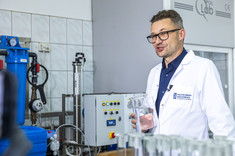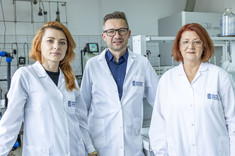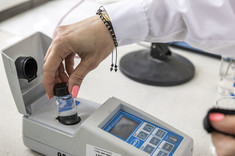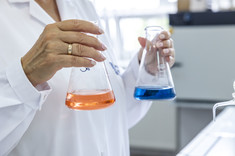Pro-ecological VIA CARPATIA – comprehensive management of rainwater runoff from the expressway. Pilot studies
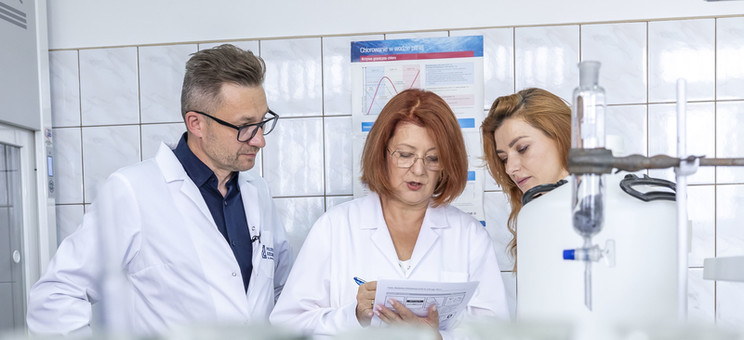
Project is performed within the VIA CARPATIA Polytechnic Network ointhe name of the President of the Republic of Poland Lech Kaczyński. The project manager is Agnieszka Stec, BEng, PhD, DSc, Assoc. Prof. from the Department of Infrastructure and Water Management at the Faculty of Civil and Environmental Engineering and Architectureof the Rzeszów University of Technology. The research project is carried out by a cooperation of three research groups: research team from the Białystok University of Technology, the Lublin University of Technology and the Rzeszów University of Technology. The project leader is the Lublin University of Technology.
Research team
Bialystok Technical University: Principal Investigator: Joanna Gwoździej-Mazur, BEng, PhD, Research team members: Izabela Bartkowska, BEng, PhD, DSc, Assoc. Prof., Lech Dzienis, BEng, PhD, DSc, Prof., Izabela Tałałaj, BEng, PhD, DSc, Assoc. Prof., Jacek Dawidowicz, BEng, PhD, DSc, Assoc. Prof., Paweł Biedka BEng, PhD
Lublin University of Technology: Principal Investigator: Małgorzata Iwanek, BEng, PhD, DSc, Assoc. Prof., Research team members: Beata Kowalska, BEng, PhD, DSc, Prof.Tit., Dariusz Kowalski, BEng, PhD, DSc, Assoc. Prof., Ewa Hołota, BEng, PhD, Paweł Suchorab, BEng, MSc
Rzeszow University of Technology: Principal Investigator: Agnieszka Stec, BEng, PhD, DSc, Assoc. Prof., Research team members: Daniel Słyś, BEng, PhD, DSc, ProfTit., Dorota Papciak, BEng, PhD, DSc, Assoc. Prof.
Project description
Climate changes observed in recent decades have changed the nature of rainfall. Snowless winters are more common, and in summer there are heavy rains preceded by long periods without rain, which causes unfavourable changes in the hydrological cycle of the catchment area. This problem also concerns Poland, which has very low water resources at the annual level of 1,600 m3 per average inhabitant, with the European average being approximately 4,500 m3. This places our country among countries with resources lower than Syria, Ethiopia, Iran or Egypt. In the EU, only Malta, Cyprus and the Czech Republic have lower resources than Poland.
Due to the increasing water deficit, attention is increasingly being paid to the possibility of retaining rainwater where it occurs. Local management of rainwater not only reduces the amount of water introduced into the storm sewage system, but also has environmental and hydrological advantages – it helps raise the groundwater level, has a positive effect on the microclimate by providing water to plants, pre-purifies rainwater, and supports the prevention of urban floods. One of the methods of sustainable rainwater management is its economic use in building installations. Stored and pre-treated rainwater can be used, among others, for: for washing, flushing toilets, cleaning and watering plants. Thanks to this, it is possible to achieve significant savings in the purchase of water from the water supply network.
Taking this into account, research was undertaken to develop methodological foundations and assess the possibilities of comprehensive management of rainwater runoff from a highway using the example of the Via Carpatia road. As part of the project, pilot studies will be carried out to assess the concentration and loads of pollutants in runoff from expressways and in runoff from rest areas, assess the degree of contamination of water and ground around retention reservoirs, which are the final element of the current management of collected rainwater, assess possibilities and feasibility of economic use of rainwater in rest areas facilities. The result of the research carried out as part of the task will be the development of a new technology for pre-treatment and storage of rainwater used for purposes that do not require drinking water quality. Empirical research will make it possible to verify the adopted conceptual assumptions. The results of research conducted as part of the project will guide planned further joint activities of the three polytechnics, including wider use of rainwater in rest areas facilities.
The results of the research will make it possible to expand research horizons for the development of new technologies in the long-term period related to the development of materials used in rainwater treatment processes, new solutions for rainwater storage and pre-treatment devices, and to outline changes in the approach to water resources management and technological processes. An indirect effect of the research in the long term may be an increase in the ecological awareness of the population and, consequently, more rational management of water resources.
The practical applications of implementing systems for the economic use of rainwater from expressways include: protection of water resources, increasing water retention in the catchment area, improving the functioning of drainage systems, as well as financial benefits. This is particularly important in the conditions of intensive expansion of the expressway network observed in recent years.




